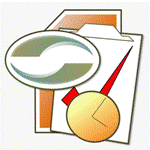Spending My Days in E-Mail are Over!
SUMMARY
- Focus on action not messaging, use tasks to track work
- Establish projects to make tasks manageable
- Process your inbox to zero using the 5Ds
- Block time for planning
- Focus on what's important, subordinate everything else
Get Out of Your Inbox
I live in Microsoft Outlook – it’s always open on my second monitor at my desktop PC.
All of my incoming information collects there; email (2 email accounts), twitter, RSS feeds, Jott emails and tasks. I track my contacts and calendar in Outlook as well. It’s very overwhelming, especially on a busy email day. I don’t think I’m alone!
There is a difference between a message, an action item and taking time to execute the action, and the developers of Microsoft Outlook agree. That’s why there are mail, task and appointment items built in. So I tried to use Outlook for task management - and failed miserably. After a few days I had so many tasks in Outlook I couldn't keep any of them in front on me. I spent most of my day moving them around - not very productive. Back to inbox management.
Project Management
About three years ago, I had my AHA moment. I've been a quality professional for over 20 years, and one of the foundations of quality management is good project management. Finding improvement opportunities is hard and takes work, however, implementing them and making them stick is REALLY hard. This is the strength of good project management - scope your implementation, plan it, staff it, and manage diligently until your scoped outcome is achieved. It works for complex organizational efforts, why couldn't it work for the individual.
That moment was the genesis of our [Outlook add-in]. Implement project management in Outlook, the tool that we all use everyday all day. Enable the Outlook objects, i.e. mail, contacts, appointments, tasks, journal items, meetings, and posts to be categorized to a project, then give people the tools to manage them like they would project objects.
New Habits
Since projects can be aligned to goals [1] and I can now align tasks to projects, I was on my way to managing my everyday work with greater focus, but I had to break some old habits and create some new ones.
- Old Habit: Stop tracking action in the email inbox. Unread messages are the death of meeting commitments. Messages age and if you get more than 20 or 30 messages a day, you will soon lose focus on those items because they are now at the bottom of your list.
New Habit: Create tasks for messages that require action and categorize them to a project.
- Old Habit: Stop using the inbox (or any other folder for that matter) as a dumping ground for mesages you think you'll need some day.
New Habit: If it's important to keep, put it in the journal or save it to a folder categorized to your project. That way it will show up in the [Project Explorer] and supporting search tools and you'll know why you saved it in the first place.
- Old Habit: Stop reading your email, process it. There should be nothing in your inbox, Merlin Mann has it right with Inbox Zero. There is something very freeing in not having mail in your inbox staring at you begging you to do something.
New Habit: Process your inbox and other collection points. Use the [5Ds] to help you decide what needs to be done with each message. The key is 'make the decision', don't let it hang in the inbox.
- Old Habit: Stop moving tasks around, either do them, reschedule them to a time when they'll actually get done, or get them off of the Daily Task List (a list of tasks that have a due date), by deleting them altogether or putting them on the Master Task List (a list of tasks that have no due date - some times referred to as the Someday/Maybe list).
New Habit: Block out time for planning, 30 minutes for weekly planning, 10 minutes a day for daily planning. Weekly is focused on reviewing current commitments, reflecting on what's important (goals) and realigning tasks and appointments to achieve what's important. Daily is focused on reviewing today's commitments and realigning tasks and appointments to meet commitments.
In an upcoming post I'll talk about David Allen's contexts (from his GTD method), which we've implemented as Focuses in the Organizer tool. They seem to work best in helping you on the day of execution to stay efficient with your focus.
Conclusion
I am now officially out of my inbox - it is now conquered. With a new mindset, a tweak to the management tool (Outlook + Organizer), and a few new habits, I am no longer overwhelmed by my email inbox.
I think the companies that are focused on developing tools for better email management are on the wrong track. I like the idea of conversations, however, I'd rather see people spend less time in their inbox and more time on execution, i.e. using project management to help guide them and focusing on execution excellence.
Do you agree?
- Chris's blog
- Login or register to post comments
-

 Printer-friendly version
Printer-friendly version Post to Twitter
Post to Twitter- Send by email
- PDF version
Recent Updates
Microsoft Outlook Add-In

Focus on Your Life, Not Your Inbox
Achieve greater focus by shifting your attention from e-mail to accomplishing what matters most!
Company News
Stay up to date with our newsletter!



